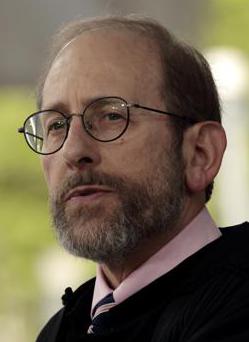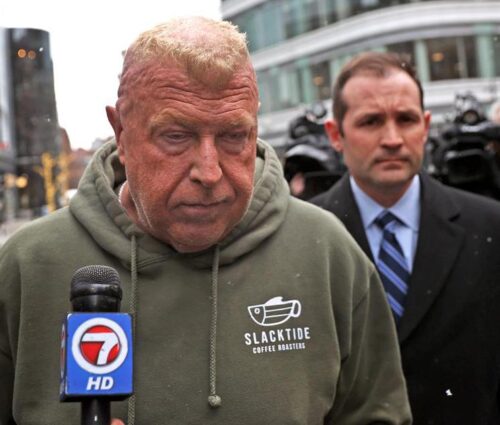President Trump lit another firestorm on social media Friday morning, vowing to end Harvard University‘s tax-exempt status.
The threat, if realized, would mean the university could start being taxed for the charitable contributions it receives, as well as taxed more heavily on its $50 billion-plus endowment.
“We are going to be taking away Harvard’s Tax Exempt Status,’’ Trump posted on Truth Social. “It‘s what they deserve!’’
Amid the president‘s escalating political battle with the university, which is already facing the freezing of $2 billion in federal grants, the threat sparked immediate outcry and existential worry amid the Harvard community, high-ranking Democratic politicians, nonprofit leaders, and legal analysts who rushed to defend not only Harvard but higher education and civil society more broadly.
With his Truth Social post, Trump “just effectively signed a statement that he is committing a crime,’’ Lily Batchelder, a law professor at New York University School of Law, wrote in an email to the Globe.
Batchelder, a former assistant secretary for tax policy at the US Department of the Treasury, added that if the president can announce he’s revoking the tax-exempt status of a charity, “we have crossed a rubicon that has no clear end.’’ She asked, then, what would stop Trump or any president “from weaponizing the IRS to intimidate any political opponent or group he dislikes into silence?’’
Trump has previously mused about canceling Harvard’s tax-exempt status, but did not explicitly vow to take the step that could dramatically erode the university’s finances.
Harvard president Alan Garber said in an interview with The Wall Street Journal that in addition to being “highly illegal,’’ revoking the university’s tax-exempt status would be “destructive to Harvard.’’ It would also send a “dire’’ message to the educational community, one that suggests “that political disagreements could be used as a basis to pose what might be an existential threat to so many educational institutions.’’
At a press conference in Boston Friday, US Senator Ed Markey of Massachusetts said Trump’s threats to Harvard are “more than just an attempt to settle the score,’’ and called his latest threat a “chilling strike against freedom.’’
“This is just textbook authoritarian behavior,’’ said Steven Levitsky, professor of government and Latin American studies at Harvard. “You will never find, in a democracy, a government attacking a private institution in this selective and arbitrary manner.’’ And if the Trump administration follows through, he said, “this is about as blatantly authoritarian an act as he’s committed in his four-month presidency.’’
The government has long exempted universities from taxes, so that “more of every dollar’’ can support student scholarships and medical research, among other efforts, said a Harvard spokesperson, adding that there’s “no legal basis to rescind Harvard’s tax-exempt status.’’ Doing so, the spokesperson said in a statement, would have grave consequences both for Harvard and “the future of higher education in America.’’
Speaking from the John F. Kennedy Federal Building, Markey said he doesn’t believe the Trump administration will stop at private institutions, and that it could also target public universities.
Earlier Friday, Markey joined Senator Elizabeth Warren of Massachusetts, Senate Minority Leader Charles Schumer of New York, and Senator Ron Wyden, a top Democrat on the Senate Finance Committee that oversees the IRS, in calling for the Department of the Treasury’s acting inspector general to determine whether Trump‘s effort to end Harvard’s tax-exempt status is a federal crime.
“It is illegal and unconstitutional — not to mention immoral — for the IRS to use politically motivated reasons to revoke the tax-exempt status of schools, hospitals, churches, or any other tax-exempt entities,’’ the senators wrote. They called the Trump effort an “organizational death sentence’’ for nonprofits without Harvard’s financial muscle.
“If the Trump administration can silence universities today, who will be next?’’ asked Diane Yentel, president of the National Council of Nonprofits, which represents more than 30,000 organizations nationwide. “This is not just an isolated policy; it’s an existential threat to the entire nonprofit sector.’’
In recent weeks, the Trump administration has demanded sweeping oversight of Harvard’s academic affairs, a move actively opposed by Garber and faculty members, after accusing the university of enabling antisemitism.
Earlier this week, Garber acknowledged the university failed to address antisemitism and Islamophobia during on-campus turbulence linked to the Gaza war. The university is challenging the grant cancellations in US District Court in Boston. The next hearing in that case is set for July 21.
Trump‘s post on Truth Social did not include how or when the federal government would make its next move against Harvard.
But legal analysts who spoke to the Globe said that Trump yanking Harvard’s tax-exempt status amid an ongoing battle over ideological control would violate the First Amendment and other provisions protecting the university.
Benjamin Eidelson, professor at Harvard Law School, said it is “blatantly unconstitutional for the government to penalize institutions financially because it disagrees with their academic activities or viewpoints.’’ Harvard Law professor Noah Feldman, meanwhile, said the administration’s repeated threats to take away Harvard’s tax-exempt status violate Harvard’s First Amendment rights “by targeting them for their speech.’’
The IRS is supposed to be “well insulated from political pressure from the president,’’ said Alan Feld, law professor at Boston University School of Law. He noted that if a threat were to turn into a legal proceeding, “Harvard would have a lot of procedural steps to go through before anything would actually occur.
“My money would be on Harvard to win that battle in the courts, but it would take a lot of effort and energy and time,’’ he added. “The claim may be close to frivolous, but nevertheless you have to combat it, and you have to pay attention to it.’’
Levitsky, co-author of the best-selling book “How Democracies Die,’’ said Trump‘s latest moves are a harbinger of how a democracy can end, unless civil society resists.
“We’re not living in an era of military coups and juntas and tanks in the streets,’’ he said. “We’re living in an era in which democracy is killed by elected leaders who weaponize the machinery of government.’’
.


